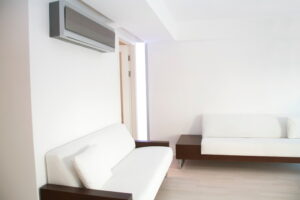If you’ve been researching heating and cooling options for your home, you may have come across ductless mini split heat pumps. These systems offer an alternative to traditional HVAC setups that rely on ductwork to distribute air throughout your home. But how does ductless cooling and ductless heating in Vidalia, GA work, and can it really provide the same level of comfort as a standard central heating and cooling system? We’re here to break it down for you.
How Does a Ductless Heating System Work?
A ductless mini split heat pump consists of two main components: an outdoor compressor/condenser and one or more indoor air-handling units. These units are connected by a small conduit that houses the refrigerant lines, power cables, and a drain line. Unlike traditional forced-air systems that push heated or cooled air through ductwork, a ductless system delivers conditioned air directly into individual rooms or zones.
Here’s a step-by-step look at how the system works:
Heat Transfer Through Refrigeration
In heating mode, the system extracts heat from the outdoor air (even in cold weather) and transfers it inside. In cooling mode, it reverses the process by removing heat from indoor air and releasing it outside.
Zoned Comfort Control
Each indoor unit operates independently, allowing you to set different temperatures for different rooms or zones. This level of control can lead to enhanced comfort and improved energy efficiency, as you only heat or cool the spaces you’re using.
No Ductwork Needed
Because these systems don’t rely on ducts, they eliminate energy losses associated with duct leaks or poor insulation. The lack of ducts also makes installation easier and more flexible, especially for homes that don’t have existing ductwork.
Will a Ductless System Work Well Enough?
The big question homeowners have is whether a ductless system can provide the same level of comfort as a traditional central HVAC system. The answer? In many cases, yes! But there are a few considerations to keep in mind.
Advantages of Ductless Mini Split Systems
Efficient Heating and Cooling
Modern ductless heat pumps can operate efficiently even in extreme temperatures, making them a viable option for year-round comfort.
Improved Indoor Air Quality
Traditional ducted systems can accumulate dust, allergens, and mold over time, negatively impacting air quality. With ductless systems, there are no ducts to collect these pollutants.
Lower Energy Costs
Ductless systems use inverter-driven compressors that adjust output based on demand, reducing energy consumption compared to single-stage central systems.
Flexible Installation
These systems are ideal for older homes without ducts, room additions, garages, or any space where running ductwork would be challenging or expensive.
Potential Drawbacks
Upfront Cost
While ductless systems can save money in the long run through energy efficiency, the initial installation cost can be higher than a traditional system.
Aesthetic Considerations
Indoor air handlers are mounted on walls or ceilings, which some homeowners may find less visually appealing compared to hidden ductwork.
May Not Be Ideal for Large Homes
In larger homes, multiple indoor units may be required to adequately heat and cool the entire space, which could increase costs and complexity.
Is a Ductless System Right for You?
Ultimately, whether a ductless mini split system is the right choice depends on your specific home layout, heating and cooling needs, and budget. If you’re looking for a highly efficient, customizable, and duct-free solution, a ductless heat pump could be the perfect fit. However, for larger homes or those with existing ductwork, a traditional central HVAC system might still be the better choice.
At Premier Heating & Air, we specialize in helping homeowners find the best comfort solutions for their needs. If you’re considering a ductless heating and cooling system, contact us today for a consultation. We’ll help you determine if it’s the right fit for your home and provide professional installation for optimal performance.


